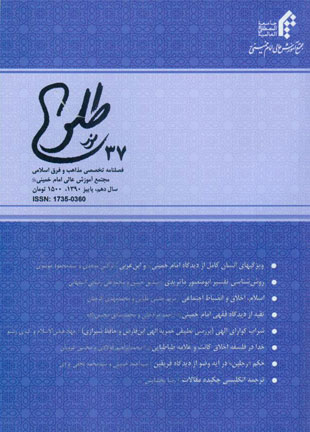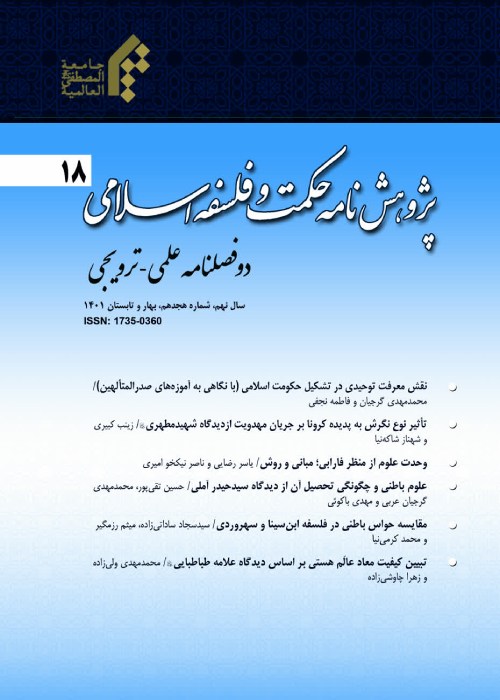فهرست مطالب

پژوهشنامه حکمت و فلسفه اسلامی
سال دهم شماره 37 (پاییز 1390)
- 174 صفحه، بهای روی جلد: 15,000ريال
- تاریخ انتشار: 1390/12/10
- تعداد عناوین: 7
-
صفحه 25
-
صفحه 57
-
شراب گوارای الهی / بررسی تطبیقی خمریه الهی ابن فارض و حافظ شیرازیصفحه 101
-
Page 5The concept of perfect man is one of the rooted issues of mysticism from one side, and those of philosophy set forth for discussion from another. As it were, the issue of perfect man has been deeply tied up with the theoretical mysticism which along with monotheism constitutes the core element of mysticism. The folk of Allah hold that perfect man is the perfectly God-displaying mirror who can be embraced as the criterion and example for other human beings. When He wished to observe His Essence, Allah Almighty manifested Himself along with all His Names and Attributes in perfect man. Perfect man has been the epiphany of the greatest Divine Name embracing all Names and Attributes which have been expanded on the scene of existence thus bringing him into existence. Ibn Arabi has called man the vicegerent and all-comprehensive being. The reason for such nomination is that man is all-comprehensive who has all latent truths of existence. After the creation of the world, the maintenance of emanation may reach all phenomena through perfect man; and vice versa all those phenomena may pass the arc of ascent through the channel of perfect man. Perfect man is the soul and spirit of all phenomena of the world penetrating in all lives and souls. Were he not there, the whole earth would perish. لولا الحجة لساخت الأرض بأهلها " " “Did the vicegerent of Allah not exist, the whole earth would perish along with everything in it.”
-
Page 25As a celebrated theologian and the founder of Maturidite theological school in the eastern world of Islam, Abu Mansur Maturidi (D. 333 L. A. H.) is among the first scholars to offer his particular so-called method of interpretation of the Qur’an. As the forerunner of the reformation call among the Muslim community and the proclamation of moderate method between Mu’tazilite and Ahlulhadith (traditionalists) methods and after he has introduced his epistemological and theological principles, Abu Mansur went to interpret the Qur’an. Under “the Sunnite interpretations”, Maturidite interpretation has made use of the two methods of intellect and narration; and viewing his expertise in theology and fiqh it has theological and legal tropism. Whether Abu Mansur was successful in his objectives of following the moderate way and how he could hold fast to the sound method keeping away from erroneous ways like personal opinion interpretation are questions supposed to be answered by this article. In his survey, the author has made use of the principles and rules of exegeses comparatively.
-
Page 57Social discipline means the cooperation and coordination of members of a society in order to reach their shared objectives. It is nowadays counted as one of the key standards for the assessment of the growth of collective rationality civilization and social development of one society. Whether in making law or putting it into practice or in education, religion can prepare the religious members of a society to assume their social responsibilities particularly their disciplined behavior and in coordination with other members of that society. As the creator of one of the biggest civilization in this regard, Islam has called Muslims to come to erect one unanimous community. In all its instructions particularly those of social ethics, Islam has highlighted factors such as justice, cooperation, brotherhood, forgiveness, keeping one’ promises, truthfulness, and trustworthiness which all lead to the unanimity of the society and the growth of sense of common responsibility and cooperation.
-
Page 75Taghiye,***** is one of the jurisprudential and theological beliefs of Shi,at which is rooted in Quran. It means to prevent from losses and damages by other people through doing something according to their views. The legality of taghiye has been approved by all Shiite jurisprudents and they have been discussed about it, s due laws and issues. Imam Khomeini (Rh) has also discussed narrowly about taghiye in different Islamic jurisprudential books and has regarded it as a true secondary rule. He belives that taghiye is legitimate against all of the people and that it is running through the laws and issues. He also believes that performance of the obligation is sufficient according to taghiye and there is no need for the repetition or performance of an obligation within or outside its prescribed time.
-
The Divine Refreshing Wine (A comparative study of Ibn Farid's Divine Khamryyah and Hafid of Shiraz)Page 101Ibn Farid and Hafid have many common issues. The concept, however, of wine in the literature of these two mystics is an under seal secret interpreted differently by the two mystics. Ibn Farid’s Khamryyah is an independent eulogy on this regard, and Hafid’s Divan (a collection of poems) is replete with wine and drunkenness. The similarity of cultural and social circumstances of Hafid and Ibn Farid, Sufism thriving at that time, and the use of symbolic language made their poetic languages to come together in particular concerning wine as the symbol of divine love. In what follows, the author has dealt with the fact that Hafid’s Khamryyah has been touched by Ibn Farid’s. Some differences, however, can easily be seen in the poems of the two dealt with comparatively somehow.
-
Page 117Allamah Taba Tabai’s difference from Kant in theology stems from their different views on the intellect and the resources of knowledge. The difference of opinions in theology leads to those in humanities. Kant has reduced the position of God to the level of some ethical presupposition confining God to the limits of the understanding of pure reason so that He has no right to break the laws of ethics drawn from pure reason. Furthermore, Kant’s belief concerning divine attributes is not reconcilable with his philosophical principles, because he denies any kind of theoretical knowledge of God (even by practical reason), thus he is not to make a claim to have vindicated attributes for God nor to have known them theoretically. Nonetheless, Allamah Taba Tabi believes in the possibility of knowledge and vindication of God. God, Allamah Taba Tabi argues, is self-evident; the subjective and objective signs are the indicative evidence for the existence of God and Hisattributes. Moreover, there are some decisive and irrefutable proofs establishing theexistence and unity of God.
-
Page 145The discrepancy between the Shiite and Sunnite in how-performing the feetablution spins over three pivots: the Qur’anic survey, the study of traditions and hadiths, and a historical research. The Shiite scholars believe that when making minor ablution, according to the ablution verse (al-Ma’ida: 6), Muslims are to wipe their feet, because " "أرجلكم follows the grammatical position of " أمسحو ا " whether in Nasb (accusative) ending or Jarr (genitive) ending. The Sunnite scholars, however, hold that they should wash their feet for ablution, because the related washing-suggesting traditions, they say, take priority over the verse of Qur’an and because " أرجلكم " follows the grammatical position of ". "فأغسلوا The related washing-suggesting traditions, the Shiites argue, goes contrary to the Qur’an from one side and to the related wiping-suggesting traditions from nother, thus the former traditions remains invalid. Because they comply with the Qur’an, the latter traditions remain with the Qur’an and valid. Washing the feet was for the first time innovated at the time of Uthman, the third caliph, and promoted in the Islamic territories by force during the Umayyad dynasty particularly by Hajjaj of Thaqif tribe.


